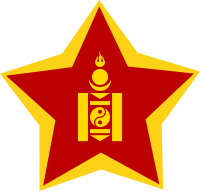Mongolian People's Army
| Mongolian People's Revolutionary Army | |
|---|---|

Emblem of Mongolian People's Army
|
|
| Active | March 1921 – 1992 |
| Country |
|
| Branch | Army |
| Type | Cavalry, Infantry, Aviation, Artillery, Armoured corps, Engineering corps |
| Role | Military force |
| Garrison/HQ | Ulan Bator, Khovd, Bayan-tumen, Mongolia |
| Nickname(s) | Mongolian People's Army |
| Engagements |
Soviet–Japanese border conflicts Post war |
Soviet–Japanese border conflicts
Post war
The Mongolian People's Army (Mongolian: Монголын Ардын Арми or Монгол Ардын Хувьсгалт Цэрэг) or Mongolian People's Revolutionary Army was established on 18 March 1921 as a secondary army under Soviet Red Army command during the 1920s and during World War II. In 1992, when the Mongolian People's Republic dissolved, the army's structure changed. It was then reorganized and renamed as the General Purpose Force.
One of the first actions of the new Mongolian People's Revolutionary Party authorities was the creation of a native communist army in 1920 under the leadership of adept cavalry commander Damdin Sükhbaatar in order to fight against Russian troops from the White movement and Chinese forces. The MPRP was aided by the Russian SFSR Red Army, which helped to secure the Mongolian People's Republic and remained in its territory until at least 1925.
Initially during the native revolts of the early 1930s and the Japanese border probes beginning in the mid-1930s, Soviet Red Army troops in Mongolia amounted to little more than instructors for the native army and as guards for diplomatic and trading installations.
However, in the 1939 Battles of Khalkhin Gol (or Nomonhan) heavily armed Red Army forces under Georgy Zhukov assisted by Mongolian troops under Khorloogiin Choibalsan decisively defeated Imperial Japanese Army forces under Michitarō Komatsubara.
...
Wikipedia
